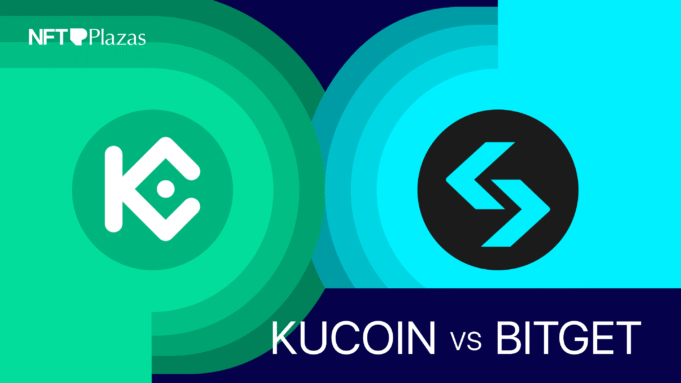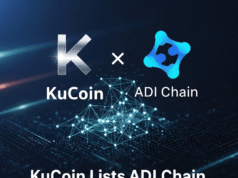+3.26%
+5.96%
+4.68%
-1.33%
+2.86%
-4.63%
The crypto exchange market is competitive, with KuCoin and Bitget emerging as key players. By 2025, both platforms will likely continue to vie for dominance, offering traders access to digital assets. Choosing between them requires considering individual trading styles and risk tolerance. KuCoin, established in 2017, is known as the “People’s Exchange,” boasting over 40 million users across 200+ countries. Bitget, founded in 2018, has grown rapidly.
KuCoin’s strength lies in its extensive selection of listed tokens, often providing early access to new projects. It offers comprehensive trading options, including spot, margin, futures, and options trading. The platform also provides various staking products for earning passive income.
Bitget is known for its copy trading feature, which allows users to replicate the trades of experienced traders. It also offers Bitget Earn, providing staking services for passive income.
While both platforms offer standard features like spot trading, P2P platforms, and margin trading, nuances exist. KuCoin offers diverse derivative products like options and leveraged tokens, appealing to sophisticated traders. Bitget features copy trading and pre-market trading, catering to a broader audience seeking social trading experiences.
Here’s a comparison of specific features:
| Feature | KuCoin | Bitget |
|---|---|---|
| Copy Trading | No | Yes |
| Options Contracts | Yes | No |
| Leveraged Tokens | Yes | No |
| Pre-Market Trading | No | Yes |
Fees are crucial for traders. Both KuCoin and Bitget offer competitive rates, but differences can impact profitability.
| Service | KuCoin Fees | Bitget Fees |
|---|---|---|
| Spot Trading | 0.1% – 0.3% (depending on asset class) | 0.1% (maker & taker) |
| Futures Trading | 0.02% (maker) / 0.06% (taker) | 0.02% (maker) / 0.06% (taker) |
Bitget generally offers a simpler fee structure for spot trading, while futures fees are identical. Holding native tokens (KCS for KuCoin, BGB for Bitget) can unlock further discounts.
Security is paramount. KuCoin emphasizes multi-factor authentication, withdrawal anti-tampering measures, and proof-of-reserves. Bitget focuses on its protection fund, cold storage, and advanced security features like anti-phishing codes. Both platforms demonstrate a strong commitment to security, but users should practice good security hygiene.
User reviews suggest areas for improvement in customer support for both exchanges. While both offer 24/7 support via email and live chat, response times and resolution effectiveness have been criticized.
Ultimately, the choice between KuCoin and Bitget depends on individual trading needs and preferences.
Here’s a summary table comparing key metrics:
| Metrics | KuCoin | Bitget |
|---|---|---|
| Inception Year | 2017 | 2018 |
| Global User Base | 40M+ | 120M+ |
| Geographical Reach | 200+ countries | 150+ countries |
| Native Cryptocurrency | KCS | BGB |
| Listed Tokens | 1,000+ | 600+ |
| Trading Pairs | 1,300+ | 775+ |
KuCoin offers P2P, spot, margin, futures, options, bot, and leveraged tokens trading. Bitget offers spot, P2P, margin, on-chain, block, futures, pre-market, bot, and copy trading.
KuCoin offers Flexible Savings, On-chain Staking, KCS Staking, Shark Fin, Dual Investment, Snowball, KuMining, Crypto Lending, and KCS loyalty. Bitget offers Fixed/Flexible Earn, On-chain Earn/Yield, HodlerYield, Shark Fin, Crypto Loans, and Dual Investment.
Both platforms support 100+ payment methods. KuCoin includes wire transfer, Google/Apple Pay, and third-party channels. Bitget includes SEPA, Apple/Google Pay, debit/credit card, and third-party providers.
KuCoin security features: multi-factor authentication, withdrawal anti-tampering, proof-of-reserves, data leak prevention, firewalls, DDoS protection, unified egress management, and centralized security logs. Bitget security features: proof-of-reserves, protection fund, two-factor authentication, anti-phishing code, cold storage, withdrawal whitelists, and fund code.
KuCoin possesses PCI DSS and ISO/IEC 27001 certifications; registered with FIU-India and has applied for MiCAR license in Austria; holds licenses in Seychelles and the Cayman Islands. Bitget has regulatory licenses in multiple countries, including Argentina, Bulgaria, the UK, and Australia. Both have iOS and Android mobile apps.
KuCoin Pros: Early access to new tokens, multiple trading and staking options, advanced trading tools, KuCoin Pay, low trading fees, intuitive interface, detailed educational resources, exclusive benefits for institutional traders.
KuCoin Cons: Limited trading bots, no copy trading, KuCard availability limited to EEA residents, unavailable in many countries including the US.
Bitget Pros: Top-ranked copy trading platform, quantum swap contracts, numerous automated bots, high-yield staking and liquidity mining products, suitable for new traders, simple interface, multiple features including Launchhub, comprehensive learning resources, exclusive privileges for institutional investors.
Bitget Cons: No standard crypto options, lower referral commission, less global coverage including US traders.
Here’s a detailed feature comparison:
| Feature | KuCoin | Bitget |
|---|---|---|
| P2P Platform | ✓ | ✓ |
| Spot Market | ✓ | ✓ |
| Margin Trading | ✓ (Up to 100x) | ✓ (Up to 125x) |
| Trading Bots | ✓ | ✓ |
| Futures Contracts | ✓ | ✓ |
| Options Contracts | ✓ | х |
| Leveraged Tokens | ✓ | х |
| OTC Trading | ✓ | ✓ |
| Convert | ✓ | ✓ |
| NFT Marketplace | ✓ | ✓ |
| On-Chain Trading | х | ✓ |
| Copy Trading | х | ✓ |
| Pre-Market Trading | х | ✓ |
| Paper Trading | ✓ | ✓ |
Here’s a fee comparison:
| Product / Service | KuCoin Fees | Bitget Fees |
|---|---|---|
| Spot Trading | Asset Class A: 0.1%, Class B: 0.2%, Class C: 0.3% | 0.1% maker, 0.1% taker |
| Futures Trading | 0.02% maker, 0.06% taker | 0.02% maker, 0.06% taker |
Both offer deposit fee of Nil. Withdrawal fees differs based on the cryptocurrency and blockchain you select.
Referral commissions: KuCoin offers up to 35% commission. Bitget offers up to 25% discount. KuCoin’s affiliate commission is up to 60%. Bitget’s affiliate commission is up to 50%.




